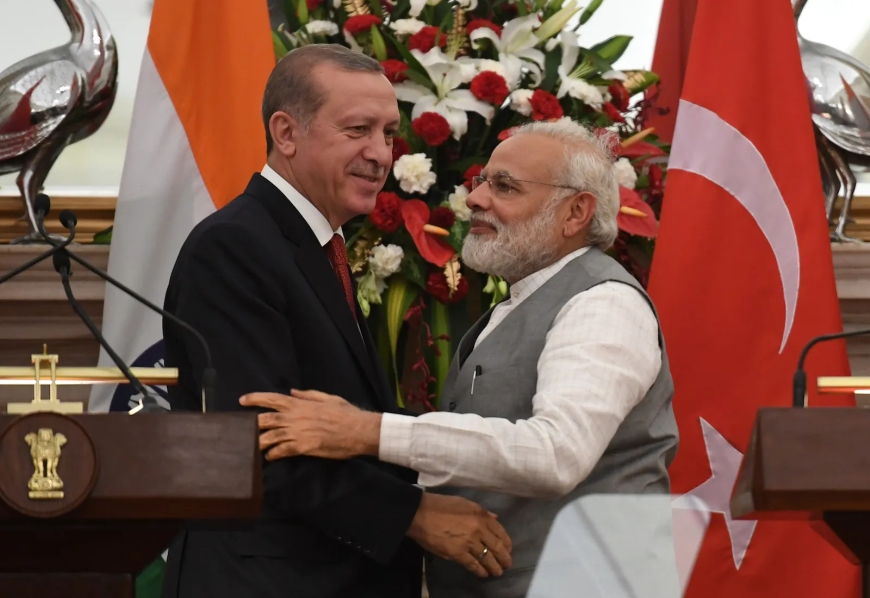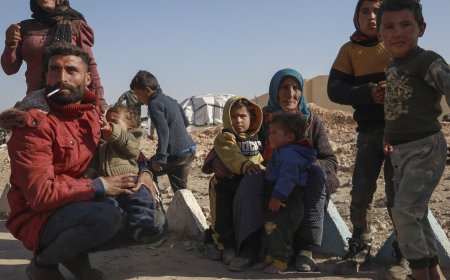Is Erdogan Mistaking India for Syria? A Closer Look at Turkey’s Shifting Diplomacy
Erdogan’s recent statements on Kashmir and his fluctuating narrative on India have led to a crucial question: Does the Turkish President perceive India as a fragmented, conflict-ridden state like Syria? His repeated interference in India’s internal matters reflects a breach of diplomatic conduct and a direct challenge to India’s sovereignty.

In South Asia, where most global leaders opt for neutrality during India-Pakistan tensions, Turkish President Recep Tayyip Erdogan continues to stand out for his open support of Pakistan. This stance not only raises questions about Turkey’s diplomatic integrity but also casts a shadow on Erdogan’s understanding of regional dynamics—especially in relation to India.
While Erdogan champions Muslim unity on global platforms, his silence on the persecution of Uyghur Muslims in China reveals a stark contradiction. His repeated support for Pakistan and tacit submission to Chinese pressure expose the double standards embedded in Turkey’s foreign policy. This inconsistency has significantly eroded Erdogan’s credibility on the world stage.
Erdogan’s recent statements on Kashmir and his fluctuating narrative on India have led to a crucial question: Does the Turkish President perceive India as a fragmented, conflict-ridden state like Syria? His repeated interference in India’s internal matters reflects a breach of diplomatic conduct and a direct challenge to India’s sovereignty.
However, Erdogan may be overlooking a key reality—India is not Syria. It is a vibrant, multicultural democracy with a strong military and internal stability. Unlike Syria, where global powers have intervened militarily, India possesses a resilient national spirit and is fully capable of defending its territorial and political integrity.
His alignment with Pakistan not only harms Turkey’s international image but inadvertently boosts India's reputation as a stable and responsible power. As the global power balance shifts, India’s strategic patience and diplomatic maturity are emerging as key strengths—qualities that Turkey’s current approach fails to recognize.
Moreover, Erdogan has repeatedly raised the Kashmir issue at the United Nations, echoing Pakistan’s position. This aligns with his earlier attempts to project himself as a leader of the Muslim world by supporting radical elements in Syria, Libya, and Azerbaijan. But India is neither war-torn Syria nor an unstable state—it's a sovereign powerhouse in global politics.
Turkey’s pro-Pakistan rhetoric signals a narrow and imbalanced foreign policy, while India continues to assert itself through calm diplomacy and responsible leadership. In the long run, such immature provocations could prove costly for Turkey. No propaganda campaign can shake India’s standing in global forums today.
Erdogan’s motivations warrant scrutiny. Is this driven by his ambition to lead the Muslim world? A strategic alliance rooted in religious solidarity with Pakistan? Or merely a diversion from Turkey’s growing domestic issues? Whichever the case, it is evident that Erdogan’s anti-India rhetoric is more political maneuvering than principled foreign policy.
Ironically, Erdogan presides over a country where journalists are jailed, Kurds are bombed, and constitutional norms are repeatedly manipulated. Can such a leader credibly criticize a democratic society like India?
Perhaps it is time Erdogan turned his focus inward—to the state of democracy and freedom in his own country—before lecturing others.













































